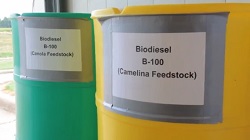 While the trend is to build big, commercial-sized biodiesel refineries, a smaller business model might be what some rural communities need. This article from inArkansas.com tells the story of a refrigerator-sized biodiesel microbrewery that could turn 870,000 acres of farmland near the Delta town of DeWitt into the green fuel.
While the trend is to build big, commercial-sized biodiesel refineries, a smaller business model might be what some rural communities need. This article from inArkansas.com tells the story of a refrigerator-sized biodiesel microbrewery that could turn 870,000 acres of farmland near the Delta town of DeWitt into the green fuel.
The box is a miniature biorefinery. It turns waste vegetable oils into biodiesel. Its operator is Johnny Davis, a semi-retired farmer who owns the crumbling gas station, a feed business and a cattle farm.
The refinery can pump out between 50,000 and 80,000 gallons of the liquid per year, which Davis will sell to the city of DeWitt for use in the same trucks that collect the waste oil input, as well as some tractors and mowers.
Davis and the mini-refinery are small cogs in what is planned to be a giant machine of job creation in the Delta region. The plan traces back to alt.Consulting, a nonprofit in Pine Bluff that works to grow entrepreneurship in rural areas.
[U]niversity professors in Arkansas were studying a crop known as camelina. The crop seemed perfect for conversion to fuel:• It’s not suitable for human consumption, so it wouldn’t compete with food grains;
• It could thrive in cold temperatures, so farmers could grow it in their off season; and
• Byproducts of the seed are rich in omega-3 acids and could be used in animal feed.
The nonprofit’s idea was to scale the refinery project from small to large and factor out transportation costs.
When the current biorefinery is in stable use, alt.Consulting reclaims it and replaces it with a larger micro-refinery that can turn the camelina into biodiesel. Read more about alt.Consulting’s Farm to Fuel program here.

